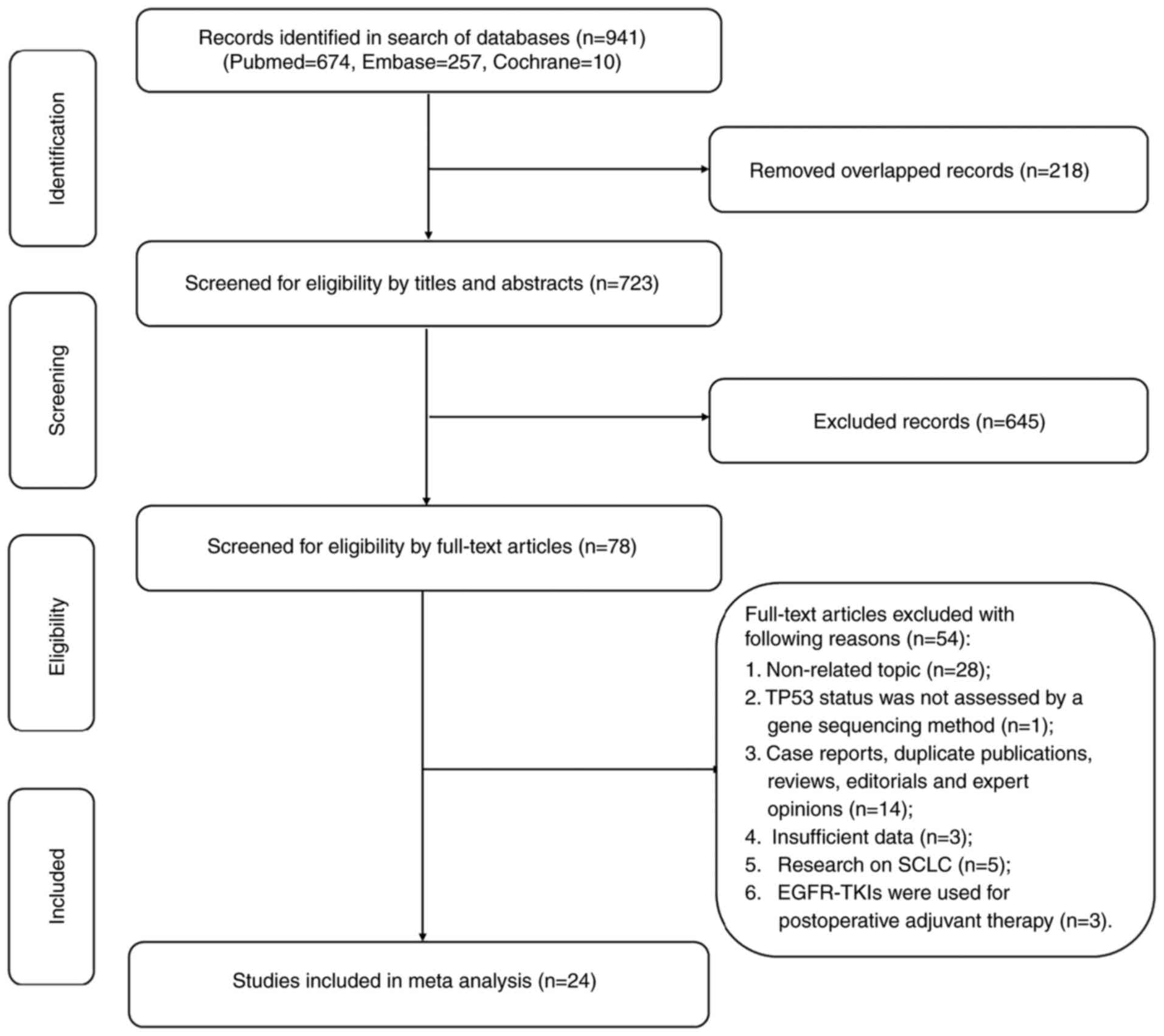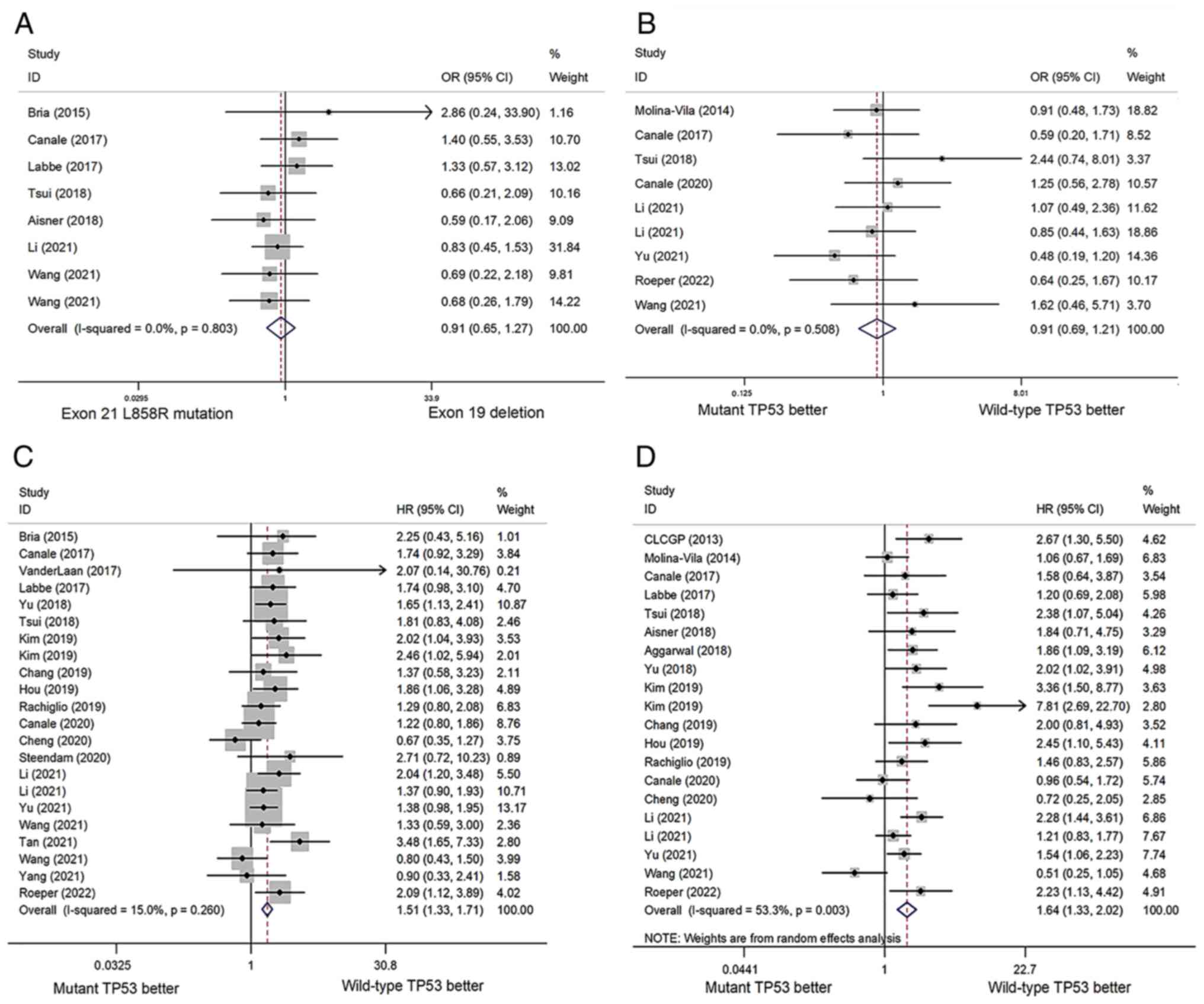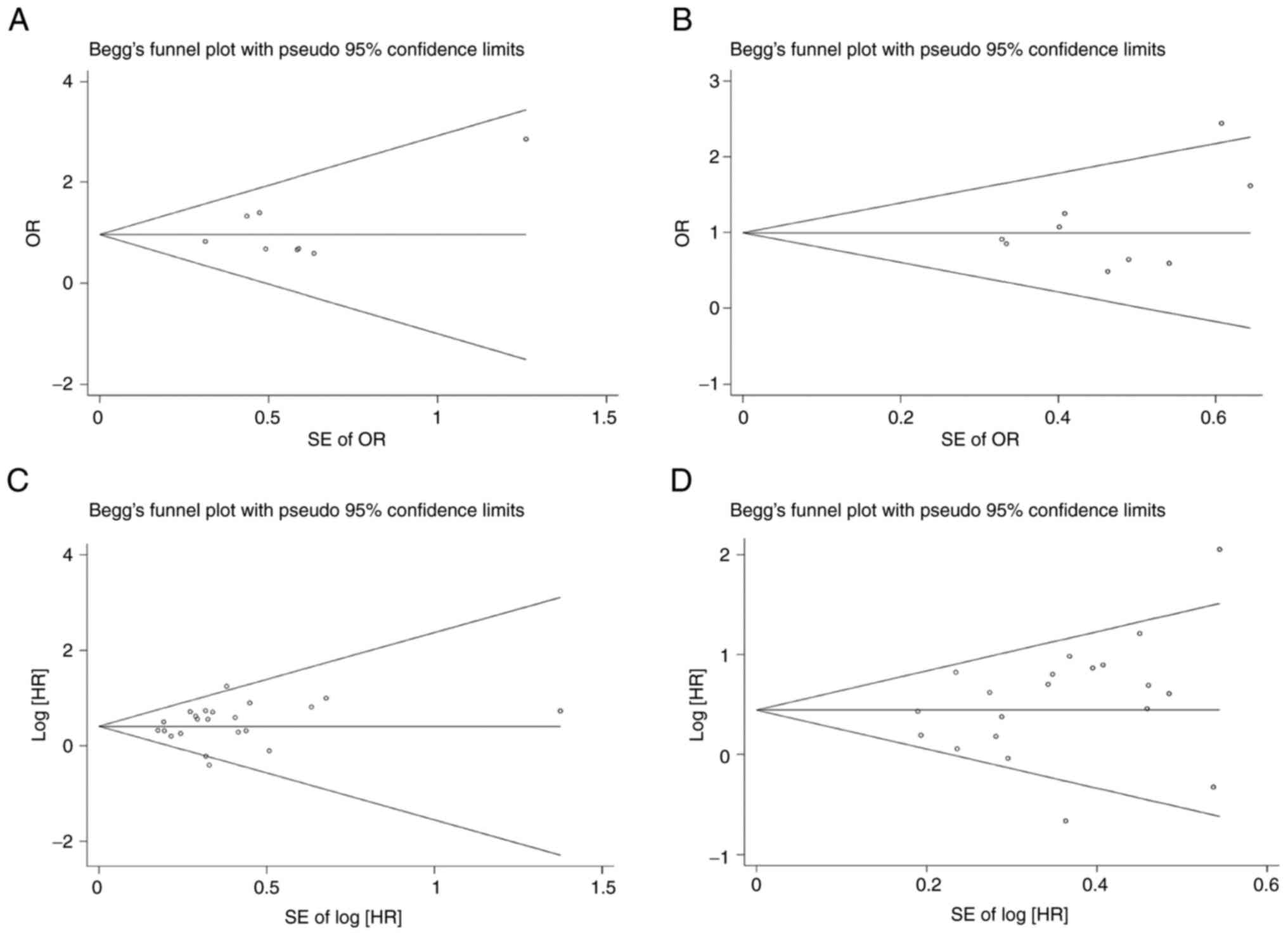|
1
|
Siegel RL, Miller KD, Fuchs HE and Jemal
A: Cancer statistics, 2022. CA Cancer J Clin. 72:7–33. 2022.
View Article : Google Scholar : PubMed/NCBI
|
|
2
|
Melosky B, Kambartel K, Häntschel M,
Bennetts M, Nickens DJ, Brinkmann J, Kayser A, Moran M and Cappuzzo
F: Worldwide prevalence of epidermal growth factor receptor
mutations in non-small cell lung cancer: A meta-analysis. Mol Diagn
Ther. 26:7–18. 2022. View Article : Google Scholar : PubMed/NCBI
|
|
3
|
Mitsudomi T, Morita S, Yatabe Y, Negoro S,
Okamoto I, Tsurutani J, Seto T, Satouchi M, Tada H, Hirashima T, et
al: Gefitinib versus cisplatin plus docetaxel in patients with
non-small-cell lung cancer harbouring mutations of the epidermal
growth factor receptor (WJTOG3405): An open label, randomised phase
3 trial. Lancet Oncol. 11:121–128. 2010. View Article : Google Scholar : PubMed/NCBI
|
|
4
|
Rosell R, Carcereny E, Gervais R,
Vergnenegre A, Massuti B, Felip E, Palmero R, Garcia-Gomez R,
Pallares C, Sanchez JM, et al: Erlotinib versus standard
chemotherapy as first-line treatment for European patients with
advanced EGFR mutation-positive non-small-cell lung cancer
(EURTAC): A multicentre, open-label, randomised phase 3 trial.
Lancet Oncol. 13:239–246. 2012. View Article : Google Scholar : PubMed/NCBI
|
|
5
|
Soria JC, Ohe Y, Vansteenkiste J,
Reungwetwattana T, Chewaskulyong B, Lee KH, Dechaphunkul A, Imamura
F, Nogami N, Kurata T, et al: Osimertinib in untreated EGFR-mutated
advanced non-small-cell lung cancer. N Engl J Med. 378:113–125.
2018. View Article : Google Scholar : PubMed/NCBI
|
|
6
|
National Comprehensive Cancer Network
(NCCN), . non-small cell lung cancer, NCCN guidelines version 1.
2022.https://www.nccn.org/guidelines/guidelines-detail?category=1&id=1450April
2–2022
|
|
7
|
Hirsch FR, Suda K, Wiens J and Bunn PA Jr:
New and emerging targeted treatments in advanced non-small-cell
lung cancer. Lancet. 388:1012–1024. 2016. View Article : Google Scholar : PubMed/NCBI
|
|
8
|
Jin Y, Shi X, Zhao J, He Q, Chen M, Yan J,
Ou Q, Wu X, Shao YW and Yu X: Mechanisms of primary resistance to
EGFR targeted therapy in advanced lung adenocarcinomas. Lung
Cancer. 124:110–116. 2018. View Article : Google Scholar : PubMed/NCBI
|
|
9
|
Guo Y, Song J, Wang Y, Huang L, Sun L,
Zhao J, Zhang S, Jing W, Ma J and Han C: Concurrent genetic
alterations and other biomarkers predict treatment efficacy of
EGFR-TKIs in EGFR-mutant non-small cell lung cancer: A review.
Front Oncol. 10:6109232020. View Article : Google Scholar : PubMed/NCBI
|
|
10
|
Marei HE, Althani A, Afifi N, Hasan A,
Caceci T, Pozzoli G, Morrione A, Giordano A and Cenciarelli C: p53
signaling in cancer progression and therapy. Cancer Cell Int.
21:7032021. View Article : Google Scholar : PubMed/NCBI
|
|
11
|
Gomes AS, Ramos H, Inga A, Sousa E and
Saraiva L: Structural and drug targeting insights on mutant p53.
Cancers (Basel). 13:33442021. View Article : Google Scholar : PubMed/NCBI
|
|
12
|
Vaddavalli PL and Schumacher B: The p53
network: Cellular and systemic DNA damage responses in cancer and
aging. Trends Genet. 38:598–612. 2022. View Article : Google Scholar : PubMed/NCBI
|
|
13
|
Kumari S, Sharma V, Tiwari R, Maurya JP,
Subudhi BB and Senapati D: Therapeutic potential of p53
reactivation in prostate cancer: Strategies and opportunities. Eur
J Pharmacol. 919:1748072022. View Article : Google Scholar : PubMed/NCBI
|
|
14
|
Hong S, Gao F, Fu S, Wang Y, Fang W, Huang
Y and Zhang L: Concomitant genetic alterations with response to
treatment and epidermal growth factor receptor tyrosine kinase
inhibitors in patients with EGFR-mutant advanced non-small cell
lung cancer. JAMA Oncol. 4:739–742. 2018. View Article : Google Scholar : PubMed/NCBI
|
|
15
|
Deben C, Deschoolmeester V, Lardon F,
Rolfo C and Pauwels P: TP53 and MDM2 genetic alterations in
non-small cell lung cancer: Evaluating their prognostic and
predictive value. Crit Rev Oncol Hematol. 99:63–73. 2016.
View Article : Google Scholar : PubMed/NCBI
|
|
16
|
Mogi A and Kuwano H: TP53 mutations in
nonsmall cell lung cancer. J Biomed Biotechnol. 2011:5839292011.
View Article : Google Scholar : PubMed/NCBI
|
|
17
|
Muller PAJ and Vousden KH: p53 mutations
in cancer. Nat Cell Biol. 15:2–8. 2013. View Article : Google Scholar : PubMed/NCBI
|
|
18
|
Skoulidis F and Heymach JV: Co-occurring
genomic alterations in non-small-cell lung cancer biology and
therapy. Nat Rev Cancer. 19:495–509. 2019. View Article : Google Scholar : PubMed/NCBI
|
|
19
|
Yu R, Bai H, Li T, Gao B, Han J, Chang G,
Zhang P, Fei K, He X and Wang J: TP53 mutations in circulating
tumor DNA in advanced epidermal growth factor receptor-mutant lung
adenocarcinoma patients treated with gefitinib. Transl Oncol.
14:1011632021. View Article : Google Scholar : PubMed/NCBI
|
|
20
|
Tsui DWY, Murtaza M, Wong ASC, Rueda OM,
Smith CG, Chandrananda D, Soo RA, Lim HL, Goh BC, Caldas C, et al:
Dynamics of multiple resistance mechanisms in plasma DNA during
EGFR-targeted therapies in non-small cell lung cancer. EMBO Mol
Med. 10:e79452018. View Article : Google Scholar : PubMed/NCBI
|
|
21
|
Stroup DF, Berlin JA, Morton SC, Olkin I,
Williamson GD, Rennie D, Moher D, Becker BJ, Sipe TA and Thacker
SB: Meta-analysis of observational studies in epidemiology: A
proposal for reporting. Meta-analysis of observational studies in
epidemiology (MOOSE) group. JAMA. 283:2008–2012. 2000. View Article : Google Scholar : PubMed/NCBI
|
|
22
|
Guyot P, Ades AE, Ouwens MJ and Welton NJ:
Enhanced secondary analysis of survival data: Reconstructing the
data from published Kaplan-Meier survival curves. BMC Med Res
Methodol. 12:92012. View Article : Google Scholar : PubMed/NCBI
|
|
23
|
Wells G, Shea BJ and O'Connell J: The
Newcastle-Ottawa scale (NOS) for assessing the quality of
nonrandomised studies in meta-analyses. 2014.
|
|
24
|
Fletcher J: What is heterogeneity and is
it important? BMJ. 334:94–96. 2007. View Article : Google Scholar : PubMed/NCBI
|
|
25
|
Chang GC, Hsu SL, Tsai JR, Liang FP, Lin
SY, Sheu GT and Chen CY: Molecular mechanisms of ZD1839-induced
G1-cell cycle arrest and apoptosis in human lung adenocarcinoma
A549 cells. Biochem Pharmacol. 68:1453–1464. 2004. View Article : Google Scholar : PubMed/NCBI
|
|
26
|
Rho JK, Choi YJ, Ryoo BY, Na II, Yang SH,
Kim CH and Lee JC: p53 enhances gefitinib-induced growth inhibition
and apoptosis by regulation of Fas in non-small cell lung cancer.
Cancer Res. 67:1163–1169. 2007. View Article : Google Scholar : PubMed/NCBI
|
|
27
|
Qin K, Hou H, Liang Y and Zhang X:
Prognostic value of TP53 concurrent mutations for EGFR-TKIs and
ALK-TKIs based targeted therapy in advanced non-small cell lung
cancer: A meta-analysis. BMC Cancer. 20:3282020. View Article : Google Scholar : PubMed/NCBI
|
|
28
|
Ulivi P, Urbini M, Petracci E, Canale M,
Dubini A, Bartolini D, Calistri D, Cravero P, Fonzi E, Martinelli
G, et al: Wide next-generation sequencing characterization of young
adults non-small-cell lung cancer patients. Cancers (Basel).
14:23522022. View Article : Google Scholar : PubMed/NCBI
|
|
29
|
Park S, Shim JH, Lee B, Cho I, Park WY,
Kim Y, Lee SH, Choi Y, Han J, Ahn JS, et al: Paired genomic
analysis of squamous cell carcinoma transformed from EGFR-mutated
lung adenocarcinoma. Lung Cancer. 134:7–15. 2019. View Article : Google Scholar : PubMed/NCBI
|
|
30
|
Riley T, Sontag E, Chen P and Levine A:
Transcriptional control of human p53-regulated genes. Nat Rev Mol
Cell Biol. 9:402–412. 2008. View
Article : Google Scholar : PubMed/NCBI
|
|
31
|
Levine AJ: The many faces of p53:
Something for everyone. J Mol Cell Biol. 11:524–530. 2019.
View Article : Google Scholar : PubMed/NCBI
|
|
32
|
Labbé C, Cabanero M, Korpanty GJ, Tomasini
P, Doherty MK, Mascaux C, Jao K, Pitcher B, Wang R, Pintilie M, et
al: Prognostic and predictive effects of TP53 co-mutation in
patients with EGFR-mutated non-small cell lung cancer (NSCLC). Lung
Cancer. 111:23–29. 2017. View Article : Google Scholar : PubMed/NCBI
|
|
33
|
Petitjean A, Mathe E, Kato S, Ishioka C,
Tavtigian SV, Hainaut P and Olivier M: Impact of mutant p53
functional properties on TP53 mutation patterns and tumor
phenotype: Lessons from recent developments in the IARC TP53
database. Hum Mutat. 28:622–629. 2007. View Article : Google Scholar : PubMed/NCBI
|
|
34
|
Poeta ML, Manola J, Goldwasser MA,
Forastiere A, Benoit N, Califano JA, Ridge JA, Goodwin J, Kenady D,
Saunders J, et al: TP53 mutations and survival in squamous-cell
carcinoma of the head and neck. N Engl J Med. 357:2552–2561. 2007.
View Article : Google Scholar : PubMed/NCBI
|
|
35
|
De Maglio G, Pasello G, Dono M, Fiorentino
M, Follador A, Sciortino M, Malapelle U and Tiseo M: The storm of
NGS in NSCLC diagnostic-therapeutic pathway: How to sun the real
clinical practice. Crit Rev Oncol Hematol. 169:1035612022.
View Article : Google Scholar : PubMed/NCBI
|
|
36
|
Hayashi H, Nadal E, Gray JE, Ardizzoni A,
Caria N, Puri T and Grohe C: Overall treatment strategy for
patients with metastatic NSCLC with activating EGFR mutations. Clin
Lung Cancer. 23:e69–e82. 2022. View Article : Google Scholar : PubMed/NCBI
|
|
37
|
Zhang Y, Sheng J, Kang S, Fang W, Yan Y,
Hu Z, Hong S, Wu X, Qin T, Liang W and Zhang L: Patients with exon
19 deletion were associated with longer progression-free survival
compared to those with L858R mutation after first-line EGFR-TKIs
for advanced non-small cell lung cancer: A meta-analysis. PLoS One.
9:e1071612014. View Article : Google Scholar : PubMed/NCBI
|
|
38
|
Hong W, Wu Q, Zhang J and Zhou Y:
Prognostic value of EGFR 19-del and 21-L858R mutations in patients
with non-small cell lung cancer. Oncol Lett. 18:3887–3895.
2019.PubMed/NCBI
|
|
39
|
Naidoo J, Sima CS, Rodriguez K, Busby N,
Nafa K, Ladanyi M, Riely GJ, Kris MG, Arcila ME and Yu HA:
Epidermal growth factor receptor exon 20 insertions in advanced
lung adenocarcinomas: Clinical outcomes and response to erlotinib.
Cancer. 121:3212–3220. 2015. View Article : Google Scholar : PubMed/NCBI
|
|
40
|
Tan J, Hu C, Deng P, Wan R, Cao L, Li M,
Yang H, Gu Q, An J and Jiang J: The predictive values of advanced
non-small cell lung cancer patients harboring uncommon EGFR
mutations-the mutation patterns, use of different generations of
EGFR-TKIs, and concurrent genetic alterations. Front Oncol.
11:6465772021. View Article : Google Scholar : PubMed/NCBI
|
|
41
|
Canale M, Petracci E, Delmonte A, Bronte
G, Chiadini E, Ludovini V, Dubini A, Papi M, Baglivo S, De Luigi N,
et al: Concomitant TP53 mutation confers worse prognosis in
EGFR-mutated non-small cell lung cancer patients treated with TKIs.
J Clin Med. 9:10472020. View Article : Google Scholar : PubMed/NCBI
|
|
42
|
Wang X, Liu Y, Meng Z, Wu Y, Wang S, Jin
G, Qin Y, Wang F, Wang J, Zhou H, et al: Plasma EGFR mutation
abundance affects clinical response to first-line EGFR-TKIs in
patients with advanced non-small cell lung cancer. Ann Transl Med.
9:6352021. View Article : Google Scholar : PubMed/NCBI
|
|
43
|
Clinical Lung Cancer Genome Project
(CLCGP); Network Genomic, Medicine (NGM), . A genomics-based
classification of human lung tumors. Sci Transl Med.
5:209ra1532013.PubMed/NCBI
|
|
44
|
Molina-Vila MA, Bertran-Alamillo J, Gascó
A, Mayo-de-las-Casas C, Sánchez-Ronco M, Pujantell-Pastor L,
Bonanno L, Favaretto AG, Cardona AF, Vergnenègre A, et al:
Nondisruptive p53 mutations are associated with shorter survival in
patients with advanced non-small cell lung cancer. Clin Cancer Res.
20:4647–4659. 2014. View Article : Google Scholar : PubMed/NCBI
|
|
45
|
Bria E, Pilotto S, Amato E, Fassan M,
Novello S, Peretti U, Vavalà T, Kinspergher S, Righi L, Santo A, et
al: Molecular heterogeneity assessment by next-generation
sequencing and response to gefitinib of EGFR mutant advanced lung
adenocarcinoma. Oncotarget. 6:12783–12795. 2015. View Article : Google Scholar : PubMed/NCBI
|
|
46
|
Canale M, Petracci E, Delmonte A, Chiadini
E, Dazzi C, Papi M, Capelli L, Casanova C, De Luigi N, Mariotti M,
et al: Impact of TP53 mutations on outcome in EGFR-mutated patients
treated with first-line tyrosine kinase inhibitors. Clin Cancer
Res. 23:2195–2202. 2017. View Article : Google Scholar : PubMed/NCBI
|
|
47
|
VanderLaan PA, Rangachari D, Mockus SM,
Spotlow V, Reddi HV, Malcolm J, Huberman MS, Joseph LJ, Kobayashi
SS and Costa DB: Mutations in TP53, PIK3CA, PTEN and other genes in
EGFR mutated lung cancers: Correlation with clinical outcomes. Lung
Cancer. 106:17–21. 2017. View Article : Google Scholar : PubMed/NCBI
|
|
48
|
Aisner DL, Sholl LM, Berry LD, Rossi MR,
Chen H, Fujimoto J, Moreira AL, Ramalingam SS, Villaruz LC,
Otterson GA, et al: The impact of smoking and TP53 mutations in
lung adenocarcinoma patients with targetable mutations-the lung
cancer mutation consortium (LCMC2). Clin Cancer Res. 24:1038–1047.
2018. View Article : Google Scholar : PubMed/NCBI
|
|
49
|
Aggarwal C, Davis CW, Mick R, Thompson JC,
Ahmed S, Jeffries S, Bagley S, Gabriel P, Evans TL, Bauml JM, et
al: Influence of TP53 mutation on survival in patients with
advanced EGFR-mutant non-small-cell lung cancer. JCO Precis Oncol.
2018.PO.18.00107, 2018. View Article : Google Scholar : PubMed/NCBI
|
|
50
|
Yu HA, Suzawa K, Jordan E, Zehir A, Ni A,
Kim R, Kris MG, Hellmann MD, Li BT, Somwar R, et al: Concurrent
alterations in EGFR-mutant lung cancers associated with resistance
to EGFR kinase inhibitors and characterization of MTOR as a
mediator of resistance. Clin Cancer Res. 24:3108–3118. 2018.
View Article : Google Scholar : PubMed/NCBI
|
|
51
|
Kim Y, Lee B, Shim JH, Lee SH, Park WY,
Choi YL, Sun JM, Ahn JS, Ahn MJ and Park K: Concurrent genetic
alterations predict the progression to target therapy in
EGFR-mutated advanced NSCLC. J Thorac Oncol. 14:193–202. 2019.
View Article : Google Scholar : PubMed/NCBI
|
|
52
|
Chang SC, Lai YC, Chang CY, Huang LK, Chen
SJ, Tan KT, Yu PN and Lai JI: Concomitant genetic alterations are
associated with worse clinical outcome in EGFR mutant NSCLC
patients treated with tyrosine kinase inhibitors. Transl Oncol.
12:1425–1431. 2019. View Article : Google Scholar : PubMed/NCBI
|
|
53
|
Hou H, Qin K, Liang Y, Zhang C, Liu D,
Jiang H, Liu K, Zhu J, Lv H, Li T and Zhang X: Concurrent TP53
mutations predict poor outcomes of EGFR-TKI treatments in Chinese
patients with advanced NSCLC. Cancer Manag Res. 11:5665–5675. 2019.
View Article : Google Scholar : PubMed/NCBI
|
|
54
|
Rachiglio AM, Fenizia F, Piccirillo MC,
Galetta D, Crinò L, Vincenzi B, Barletta E, Pinto C, Ferraù F,
Lambiase M, et al: The presence of concomitant mutations affects
the activity of EGFR tyrosine kinase inhibitors in EGFR-mutant
non-small cell lung cancer (NSCLC) patients. Cancers (Basel).
11:3412019. View Article : Google Scholar : PubMed/NCBI
|
|
55
|
Cheng Y, Ma L, Liu Y, Zhu J, Xin Y, Liu X,
Wang Y, Zhang T, Yang C, Wang S, et al: Comprehensive
characterization and clinical impact of concomitant genomic
alterations in EGFR-mutant NSCLCs treated with EGFR kinase
inhibitors. Lung Cancer. 145:63–70. 2020. View Article : Google Scholar : PubMed/NCBI
|
|
56
|
Li XM, Li WF, Lin JT, Yan HH, Tu HY, Chen
HJ, Wang BC, Wang Z, Zhou Q, Zhang XC, et al: Predictive and
prognostic potential of TP53 in patients with advanced
non-small-cell lung cancer treated with EGFR-TKI: Analysis of a
phase III randomized clinical trial (CTONG 0901). Clin Lung Cancer.
22:100–109.e3. 2021. View Article : Google Scholar : PubMed/NCBI
|
|
57
|
Steendam CMJ, Veerman GDM, Pruis MA,
Atmodimedjo P, Paats MS, van der Leest C, von der Thüsen JH, Yick
DCY, Oomen-de Hoop E, Koolen SLW, et al: Plasma predictive features
in treating EGFR-mutated non-small cell lung cancer. Cancers
(Basel). 12:31792020. View Article : Google Scholar : PubMed/NCBI
|
|
58
|
Yang GJ, Li J, Xu HY, Sun Y, Liu L, Li HS,
Yang L, Zhang Y, Li GH and Wang Y: Osimertinib for Chinese advanced
non-small cell lung cancer patients harboring diverse EGFR exon 20
insertion mutations. Lung Cancer. 152:39–48. 2021. View Article : Google Scholar : PubMed/NCBI
|
|
59
|
Wang P, Li Y, Lv D, Yang L, Ding L, Zhou
J, Hong W, Chen Y, Zhang D, He S, et al: Mefatinib as first-line
treatment of patients with advanced EGFR-mutant non-small-cell lung
cancer: A phase Ib/II efficacy and biomarker study. Signal
Transduct Target Ther. 6:3742021. View Article : Google Scholar : PubMed/NCBI
|
|
60
|
Roeper J, Christopoulos P, Falk M, Heukamp
LC, Tiemann M, Stenzinger A, Thomas M and Griesinger F: TP53
co-mutations as an independent prognostic factor in 2nd and further
line therapy-EGFR mutated non-small cell lung cancer IV patients
treated with osimertinib. Transl Lung Cancer Res. 11:4–13. 2022.
View Article : Google Scholar : PubMed/NCBI
|

















